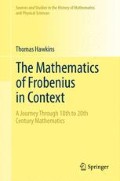Abstract
In terms of their approach to creative work, mathematicians display a spectrum of tendencies. Some focus most of their time and effort on building up a monumental theory. Sophus Lie was such a mathematician, with his focus on his theory of transformation groups. Among Frobenius’ mentors, Weierstrass, with his focus on the theory of abelian integrals and functions and the requisite foundations in complex function theory, and Richard Dedekind, with his theory of algebraic numbers and ideals, are further examples of mathematicians who were primarily theory builders. At the other end of the spectrum are mathematicians whose focus was first and foremost on concrete mathematical problems. Of course, many mathematicians fall somewhere between these extremes. A prime example is Hilbert, who created several far-reaching theories, such as his theory of integral equations, but also solved many specific problems, such as the finite basis problem in the theory of invariants, Waring’s problem, and Dirichlet’s problem; and of course he posed his famous 23 mathematical problems for others to attempt to solve. Frobenius was decidedly at the problem-solver end of the spectrum. Virtually all of his important mathematical achievements were driven by the desire to solve specific mathematical problems, not famous long-standing problems such as Waring’s problem, but in general, problems that he perceived in the mathematics of his time.
Access this chapter
Tax calculation will be finalised at checkout
Purchases are for personal use only
Notes
- 1.
See in this connection Frobenius’ 1893 memorial essay on Kronecker, in which he contrasted Kummer and Weierstrass, whose fame was based on work in a specific area of mathematics, with Kronecker, whose “far-reaching discoveries” were spread out over many disciplines [202, p. 705].
- 2.
See [397]. I am grateful to Wilfried Parys for calling this recent application to my attention.
- 3.
See Chapters 11,12and the Afterword of my book [276].
References
G. Frobenius. Gedächtnisrede auf Leopold Kronecker. Abhandlungen d. Akad. der Wiss. zu Berlin, pages 3–22, 1893. Reprinted in Abhandlungen 3, 707–724.
T. Hawkins. Emergence of the Theory of Lie Groups. An Essay on the History of Mathematics 1869–1926. Springer, New York, 2000.
A. Langville and C. Meyer. Google’s PageRank and Beyond. The Science of Search Engine Rankings. Princeton University Press, Princeton, 2006. Paperback reprint, 2012. See also the informative book review by Fernández [163].
Author information
Authors and Affiliations
Rights and permissions
Copyright information
© 2013 Springer Science+Business Media New York
About this chapter
Cite this chapter
Hawkins, T. (2013). The Mathematics of Frobenius in Retrospect. In: The Mathematics of Frobenius in Context. Sources and Studies in the History of Mathematics and Physical Sciences. Springer, New York, NY. https://doi.org/10.1007/978-1-4614-6333-7_18
Download citation
DOI: https://doi.org/10.1007/978-1-4614-6333-7_18
Published:
Publisher Name: Springer, New York, NY
Print ISBN: 978-1-4614-6332-0
Online ISBN: 978-1-4614-6333-7
eBook Packages: Mathematics and StatisticsMathematics and Statistics (R0)

